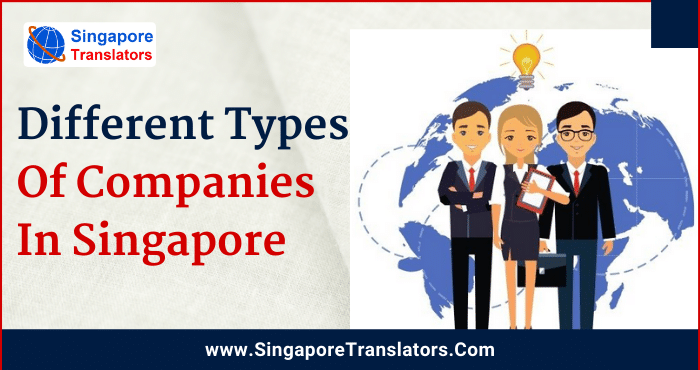
Singapore is considered one of the reputed business hubs all over Asia. The transparent regulatory framework, low tax rate, highly open economy and business-friendly environment are some of the key reasons for growing business in Singapore.
Over the years, many investors and entrepreneurs have entered Singapore to start running their business; every newcomer has a common question in their mind what will be the reliable type of business entity you should incorporate in Singapore?
In this blog, we have explained the types of business entities you can incorporate in Singapore. Moreover, if you have planned to register a company in Singapore then you must check our Complete Guide to Singapore Company Registration so that you miss any important instructions.
What are the types of companies in Singapore?
There are the three most common types of business entities in Singapore: partnership, sole proprietorship, and Limited Liability Company.
Partnership
The partnership is another type of business entity in Singapore that can only be established by at least two partners. Obviously, the partnership entity is not separate from its partners. This simply means that the partner will be cooperatively liable with other partners in the company and personally responsible for all the Company formalities and obligations, excluding the limited partners from the Limited partnership.
There are three main types of partnership in Singapore are given below:
- General partnership (GP)
- Limited partnership (LP)
- Limited liability partnership (LLP)
Key features and some of the differences between all the three types of partnership in Singapore are:
- Legal status: Limited liability partnership is a separate legal entity. In contrast, the general partnership and limited partnership are not considered separate entities.
- Partner’s liability: Partners in Singapore Limited Liability Partnership has its liabilities bounded only to their contributions in the partnership. On the other side, in the case of partners, limited partnership and general partnership have the option to hold unlimited liabilities to any accountability associated with other partners.
- Of partners: Singapore general partnership entity is limited to a minimum of two partners and a maximum of 20 partners. On the contrary, there is no maximum limit of partners in limited partnership and Limited liability partnerships.
- Imposed tax rates: The tax from the partners of a Limited liability partnership is charged on their personal income tax or corporate income tax based on if they are a corporate body or an individual. Always remember that partnership entities in Singapore are provided less tax exemption when compared with Singapore Limited Liability Company.
Compliance requirements for partnership
Establishing a limited liability partnership company in Singapore is a less burdened task when compared with a limited liability company in Singapore.
Sole Proprietorship
A sole proprietorship is undoubtedly one of the simplest and challenging business entities in Singapore. This is commonly called one Man show, which means that a complete business entity will be managed by an individual or company. There will be no partner in the sole proprietorship company. However, the owner of the company will be entirely responsible for all the business profits and losses.
Key features of a Singapore sole proprietorship
Some of the key features of Singapore sole proprietorship entity comprises of:
Legal status: A sole proprietorship company in Singapore’s key feature is that it is a legal status and is not separated from its owner.
Unlimited liability: There are no restrictions to the owner of a sole proprietorship company as they are the ones liable for all the arising liabilities, debts, and losses.
Taxation: The taxation system of a sole proprietorship company in Singapore depends on the personal income of the business owner.
Compliance requirements for a sole proprietorship
A sole proprietorship business in Singapore is defined as that type of business that involves a slight burden when talking of maintenance requirements. Two of the major duties that every business needs to consider are renewal and submission of tax returns with IRAS.
Limited Liability Company
Let us begin with a limited liability company; a limited liability company is one of the most common types of business entity in Singapore, mainly for those people who are willing to establish their own company in Singapore.
A limited liability company can be established in Singapore under the following types.
- Private company: The private limited company by shares, and Exempt private company
- Public company: Public company limited by shares and limited by guarantee.
Advantages of incorporating LLC in Singapore
The advantages of running a limited liability company in Singapore are as follows:
- Limited liability: Shareholders of the Singapore Limited liability company or the company owner are only responsible for all the liabilities equivalent to their actual value of shares invested to the company.
- Separate legal status: The separate legal status is defined as a legal entity separated from its business owners. A Limited liability company are also liable to sign contracts, acquire and own assets, can be sued or sue under its name.
- Tax advantage. The greatest advantage of a limited liability company in Singapore is that, like all other entities, a Limited Liability Company is also addressed to the income tax rate of 17%. Moreover, the Singapore government gives a unique business environment and great tax system to all the eligible companies by providing them with a plethora of tax exemptions models and tax relief which can easily reduce the tax burden.
Cons of a Singapore LLC
Undoubtedly, running a limited liability business in Singapore is beneficial, but there are also several things that every business owner requires to handle to make their business growing. Still, a private company is exempted from several reporting duties when compared with a public company. Some of the complications with Singapore limited liability company comprise:
- Filing tax returns with IRAS
- Filing annual returns with ACRA
- Holding AGMs (Annual General Meeting)
- Submitting accounting reports
- Several other duties as asked by concerned competent authorities
What are company registration options for foreign companies in Singapore?
For all the foreign individuals or businesses willing to expand their business presence in Singapore and globally, there are three types of registration options available for them.
Subsidiary
A subsidiary company basically serves as a shareholder of the parent holding company. In Singapore, a subsidiary company is usually formed under the form of a private limited company. Thus, these kinds of companies usually experience similar liabilities and benefits like a private limited company in Singapore.
Representative office
A representative office is suggested for all the foreign companies willing to expand their business in Singapore. Some common reasons for establishing a representative office in Singapore are conducting market research, testing the market, and promoting brand awareness.
Unlike a subsidiary company, a representative office also has no legal distinction. The overseas parent company will be completely responsible for all the liabilities and debts sustained by the office. Moreover, it is not granted to operate any profit-generating activities in the country.
Branch office
A branch office is considered an expansion of the parent company which already has its main office outside Singapore. For example, a branch office in Singapore grants to conduct commercial activities. However, this type of business entity is not considered as a separate legal entity, so its respective parent company will take all its relevant liabilities and assets of the branch.
When we talk of the tax system perspective of the branch office, then the branch office is referred to as the non-resident for tax purposes. In this regard, there will be no tax exemptions benefits given to the branch office of most foreign companies, including a newly incorporated company or local resident company. However, if we compare it with a subsidiary company established as a private limited company in Singapore, then a Subsidiary company will be considered more beneficial.
Which type of company is right for you?
It is always recommended to select only that type of company in Singapore, which suits you perfectly and meets your business demands.
It is also essential for every individual willing to establish their company in Singapore must consider several factors prior to making the final decision, as every company has several features, drawbacks and benefits that you might be looking for. Tax advantage, investment capital, number of the business owner, and several obligations corresponding to every type of business entity are most asked questions while setting up a company in Singapore.
We hope the above guide on types of entities in Singapore has helped you in understanding what kinds of business entities you can register in Singapore and their vital features.
Hire a translator for proper business assistance
If you are also willing to set up a company in Singapore but not getting the proper assistance to translate ACRA Documents Translation Singapore, then the team of Singapore translators is here to assist you. We have a team of highly experienced translators that offers high-quality Business Translation Services in Singapore at an affordable price.

